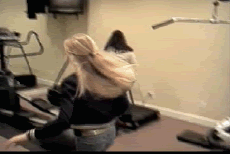blubber
Rookie
Some food for thought.
Here's an article on death by exercise from Men's Health magazine:
http://www.menshealth.com/cda/artic...e999edbbbd201099edbbbd2010cfe793cd____&page=1
I learned about the article here:
http://www.arthurdevany.com/2007/12/death_by_exerci.html
This is what I get from the article:
Exercise is better for your health then no exercise.
Lifting Weights is less likely to cause death than running long distances.
Exercising too much can be worse than exercising too little.
Here are some interesting quotes:
"Once you get past the 75th percentile of physical activity--guys who exercise more than three-quarters of the population--protection against heart disease levels off. In fact, among the most active, it actually declines slightly, according to a review in Medicine & Science in Sports & Exercise. In other words, the superactive are more likely to die than the merely active."
--------------------
"But you should work out frequently; many studies have shown that the overall amount of time you spend up and moving matters.
Some endurance exercise is fine, if you like it. Strength training is probably more than fine--it specifically prepares your body for the shock of sudden, strenuous exertion, such as shoveling snow, which is most likely to kill you if your body isn't ready for it."
---------------------
* One death per 17,000 men who exercise vigorously 1 to 19 minutes a week
* One death per 23,000 men who exercise vigorously 20 to 139 minutes a week
* One death per 13,000 men who exercise vigorously 140 or more minutes a week
----------------------
The Harvard Alumni Health Study found that heart-disease risk starts going down when you expend more than 500 calories a week and continues to decrease until you get to 2,000 calories a week. Then things level off--more exercise doesn't offer more protection.
Here's an article on death by exercise from Men's Health magazine:
http://www.menshealth.com/cda/artic...e999edbbbd201099edbbbd2010cfe793cd____&page=1
I learned about the article here:
http://www.arthurdevany.com/2007/12/death_by_exerci.html
This is what I get from the article:
Exercise is better for your health then no exercise.
Lifting Weights is less likely to cause death than running long distances.
Exercising too much can be worse than exercising too little.
Here are some interesting quotes:
"Once you get past the 75th percentile of physical activity--guys who exercise more than three-quarters of the population--protection against heart disease levels off. In fact, among the most active, it actually declines slightly, according to a review in Medicine & Science in Sports & Exercise. In other words, the superactive are more likely to die than the merely active."
--------------------
"But you should work out frequently; many studies have shown that the overall amount of time you spend up and moving matters.
Some endurance exercise is fine, if you like it. Strength training is probably more than fine--it specifically prepares your body for the shock of sudden, strenuous exertion, such as shoveling snow, which is most likely to kill you if your body isn't ready for it."
---------------------
* One death per 17,000 men who exercise vigorously 1 to 19 minutes a week
* One death per 23,000 men who exercise vigorously 20 to 139 minutes a week
* One death per 13,000 men who exercise vigorously 140 or more minutes a week
----------------------
The Harvard Alumni Health Study found that heart-disease risk starts going down when you expend more than 500 calories a week and continues to decrease until you get to 2,000 calories a week. Then things level off--more exercise doesn't offer more protection.

